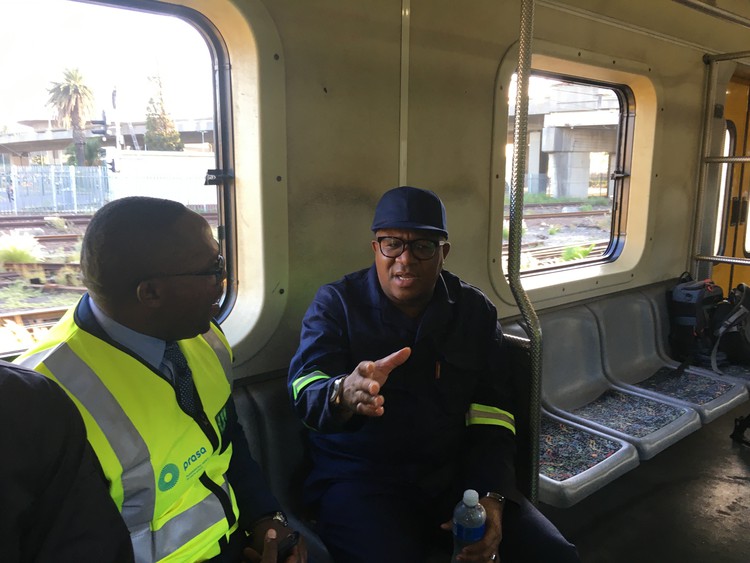Cape Town Central Line will return to service in September, says PRASA Administrator
Rail agency plans 80-bus fleet to provide alternative transport
Transport Minister Fikile Mbalula announced on Thursday the start of the refurbishment process for Cape Town’s Central Line, which has been closed since October 2019. The Central Line serves over a million people, running from Kapteinsklip station in Mitchells Plain and Chris Hani station in Khayelitsha to Cape Town station.
Mbalula’s launch follows President Ramaphosa’s promise in his 2020 State of the Nation address to allocate R1.4 billion to bring the Central Line back into working order. Mbalula led a delegation that included Deputy Minister of Transport Dikeledi Magadzi, Western Cape MEC for Transport Bonginkosi Madikizela, and PRASA Administrator Bongisizwe Mpondo. The delegation left from Cape Town station — where on Wednesday night a concrete slab fell from the ceiling, destroying access gates — in a train without window panes to the now-unused Langa station, which was revamped for the 2010 World Cup.
Mbalula spoke for close to an hour at the launch at Langa station. He committed to ridding PRASA of corruption and promised an end to “acting” positions. He stood strong behind his Administrator and vowed that anyone who stood in the way of the programme to stabilise PRASA would “get run over”.
Mbalula largely deferred to PRASA Administrator Mpondo for the technical details and timeframes, but reiterated that the Administrator’s appointment was to last only 12 months.
Madikizela expressed relief at the plan that had been presented, heralded Mbalula’s “collegiality”, and asked for patience from those who would use the Central Line.
Mpondo promised a partial resumption of service on the Central Line between September and November 2020. This would consist of ten train sets from Philippi to Cape Town station, with full service set to return in April or May 2021. The first priority for the refurbishment process would be the installation of a four-metre high wall enclosing the entire rail reserve, and the provision of security infrastructure like CCTV cameras, control rooms, and drones. The enclosing wall has been talked about by PRASA as a solution to the Central Line insecurity crisis since at least 2017.
Mpondo seemed less confident than Mbalula, citing risks such as informal settlements on the rail reserve, winter construction of the wall, long lead times for the delivery of the materials required to fix the Central Line infrastructure, as well as procurement problems within PRASA.
Mpondo promised a replacement service of a fleet of 80 buses, which would operate between stations and serve up to 5,000 passengers an hour. Mpondo emphasised that these buses had not been secured yet, and would be bought and leased once approval had been secured from the Department of Transport and National Treasury. Mpondo said that while he had consulted with the City of Cape Town, he had not yet reached an agreement with other transport operators like minibus taxi associations.
PRASA is expected back in the Western Cape High Court tomorrow on the matter of the suspension of its private security contractors.
Support independent journalism
Donate using Payfast

Don't miss out on the latest news
We respect your privacy, and promise we won't spam you.
Next: City to go back to court over refugee crisis in central Cape Town
Previous: Makana mayor and Municipal Manager face six months in prison
© 2020 GroundUp.
This article is licensed under a Creative Commons Attribution-NoDerivatives 4.0 International License.
You may republish this article, so long as you credit the authors and GroundUp, and do not change the text. Please include a link back to the original article.

